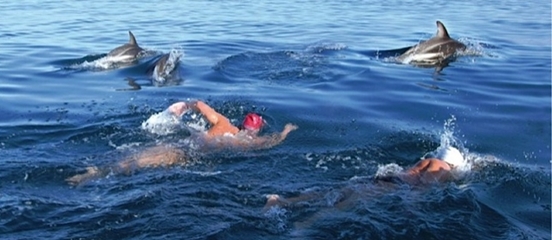|
Natural Health - Peak Performance - Longevity - Adventure
|
|
|

What is Extreme Cold Water or Ice Swimming?As there are very few who will in their life times attempt an extreme cold swim (6-11C, 43-52F) and/or an ice swim (0-5C, 32-42F), I will just touch on this. Note that the level of acclimatization below is more specific to ‘ice swims’ and may appear a bit over the top for a challenge taking place in 11C water. So you can find your own happy balance between this article and my article on how to acclimate to cold water distance swimming. See Cold Water Distance Swimming - How to Acclimate to Cold Water How to Prepare for Extreme Cold Water or Ice SwimsAll of the tips outlined in my cold water acclimation article applies for the preparation (get fat, get fit, get freezing, get focused), but with specific emphasis on the ‘get focused’ part - the mental aspects. Here is my (unscientific) summary of what happens when one climbs into water that is 5C or less (ice swim): The body quickly registers you as dying – you are in hostile turf and it must react accordingly. It will rapidly deploy its full spectrum of survival mechanisms to keep you alive and you will most probably experience intense pain, loss of breath, dizziness and the hectic feeling of your blood rushing from your extremities to protect the vital organs. It can be a frightening experience and near impossible to keep your head down and swim through it. So, again, it is largely mind over matter. (Experiences differ from person to person too and no doubt that extra body fat is a significant factor). We put ourselves through a series of ‘ice bath’ training sessions prior to such a challenge. These are large containers filled with water and ice. On a tiered basis, we bring the temperature right down to 0.5C and completely submerge ourselves to neck level for up to 16 minutes wearing only a Speedo-type costume. It seriously hurts and every minute feels impossibly long. There is also much debate as to whether you are doing yourself any good and you most certainly have to be extremely careful – it can go horribly wrong. We are slowly pushing the time limits in these conditions and have already amazed both doctors and ourselves, but are wary as there is no research to tell us that permanent damage will not result – the nerves in your fingers and toes take a good couple of days to recover even after a 10 minute session in 1C water). But one thing is for sure - the ice baths help you understand and come to terms with what is going to happen to your body in the extreme cold / ice event and, most importantly for me, they help me toughen my mind to take the pain on the day of the challenge. I was quickly reminded of the benefits of the ice bath ‘training’ (read: torture) once again on my last ice swim. It amazed me how quickly my mind went from ‘confident’ to ‘panic’ when in the ice water and the only comfort I could find was the experience gained from the these ice baths and the knowledge that I could work through the hard symptoms as my body changed – I was not going to die. Without this knowledge and experience, I may well have aborted the challenge. Another huge factor for determining success or failure on an extreme cold or ice swim, is having total comfort in the fact that your support crew is 100% on the ball and only there for you. Your life is in their hands and you need to be comfortable with that. The support crew should always include a medical professional who has recently brushed up on his/her knowledge of hypothermia and its symptoms. Don’t underestimate how much further you can push when you know you are in safe hands should something go wrong. The final important insight I will share is to remember that your swim is not over until your core body temperature returns to normal. Very often the real challenge is coping with the ‘after drop’ once you exit the water. I wont go into the biology of it, but your core temperature continues to drop after the swim and the recovery process can be very hard. So don’t let your focus go! Keep your mind strong and fight right through the recovery until the chattering teeth stop chattering – it is, after all, part of your challenge. In summary, swimming in the cold is invigorating and highly challenging. I love the required combination of fitness and a mind that needs to keep you strong while convincing you that the cold is a beautiful place (and I also enjoy a greasy burger, so not having to watch my waistline is an added bonus ;) Keep swimming, be safe. Ryan Ryan Stramrood has completed some of the world's toughest cold water and distance swims. After his first Robben Island to Blouberg crossing in 2003. Ryan has quickly stamped his mark on the sport by successfully completing the notorious English Channel swim in 2008 on his first attempt! Ryan holds 39 Robben Island crossings, including two tough two-way island crossings. He is one of a handful of people to have swum from Dassen Island to Uysterfontein on the west coast of South Africa, completed two Gibraltar Straits crossings from Spain to Morocco, the icy Pennock Island race in Alaska, from Perth to Rottnest Island in Australia and many more. Ryan has also completed two fresh water mile swims in 4°C. In February 2011, Ryan successfully completed three of the world’s most extreme swims in Patagonia, South America, including a world first rounding of Cape Horn. Ryan is also a founding member of the International Ice Swimming Association
and lives in Cape Town, South Africa. |

Articles on Swimming, Hydration, Electrolytes for Endurance Events
| |||||||||||||||||||